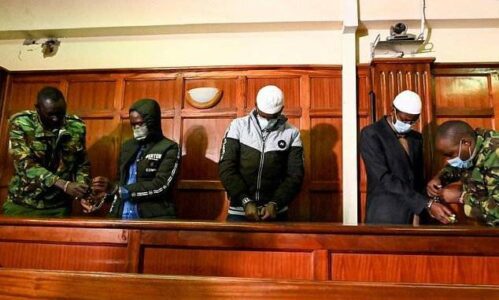
Two men guilty of conspiracy with Al-Shabaab terrorists over the Westgate shopping mall attack in Kenya
A Kenyan court found two men guilty Wednesday of conspiring with the Al-Shabaab extremists who killed 67 people in an armed rampage at Nairobi’s upscale Westgate shopping mall in 2013.
After a marathon trial that began in January 2014, a judge found that Mohamed Ahmed Abdi and Hassan Hussein Mustafa conspired with and supported the four gunmen who died in what was then Kenya’s worst terrorist attack in 15 years.
“I find them guilty on the charge of conspiracy, and convict them accordingly,” said Magistrate Francis Andayi in a judgement that took four hours to deliver with the verdict translated into Somali for the guilty pair.
They will be sentenced on October 22.
The third accused, Liban Abdullahi Omar, was given “the benefit of doubt” by Magistrate Andayi and acquitted of all charges. He was immediately allowed to leave the dock.
The judge said the convicted men “had constant communication with the attackers”, the pattern of which “betrays the fact that they may have been just friends”.
Although there was no specific evidence that they had provided material help, Magistrate Andayi said he was satisfied “their communication with the attackers was giving support to their endeavours” and justified the guilty verdict for conspiracy.
At midday on September 21, 2013, a four-man commando team stormed the Westgate shopping mall throwing grenades and firing indiscriminately on shoppers and business owners.
A four-day siege ensued — much of it broadcast live on television — during which Kenyan security forces tried to flush out the attackers and take back the high-end retail complex.
The attack was claimed by Al-Shabaab in retaliation for Kenya intervening military over the border in Somalia, where the Islamist group was waging a bloody insurgency against the fragile central government.
Kenya is a major contributor of troops to the African Union Mission in Somalia (AMISOM), which in 2011 drove Al-Shabaab out of Mogadishu and other urban strongholds after a months-long offensive.
In a car the attackers drove to Westgate, police found evidence of newly-activated SIM cards used by the gunmen. Their communications were traced, including calls to Mohamed Ahmed Abdi and Hassan Hussein Mustafa.
A fourth defendant, Adan Mohammed Abdikadir, was acquitted in early 2019 for lack of evidence.
The Westgate attack was the deadliest incident of violent extremism on Kenyan soil since the 1998 bombing of the US embassy in Nairobi, which killed 213 people.
But since the assault on the shopping complex, Al-Shabaab has perpetrated further atrocities in Kenya against civilian targets.
In April 2015, gunmen entered Garissa University and killed 148 people, almost all of them students, and many shot point blank after being identified as Christians.
In January 2019, the militants struck Nairobi again, hitting the Dusit Hotel and surrounding offices and killing 21 people.
Al-Shabaab warned in a January statement that Kenya “will never be safe” as long as its troops were stationed in Somalia, and threatened further attacks on tourists and US interests.
That same month, Al-Shabaab attacked a US military base in northeast Kenya in a cross-border raid, killing three Americans and destroying a number of aircraft.
Source: Daily Mail





